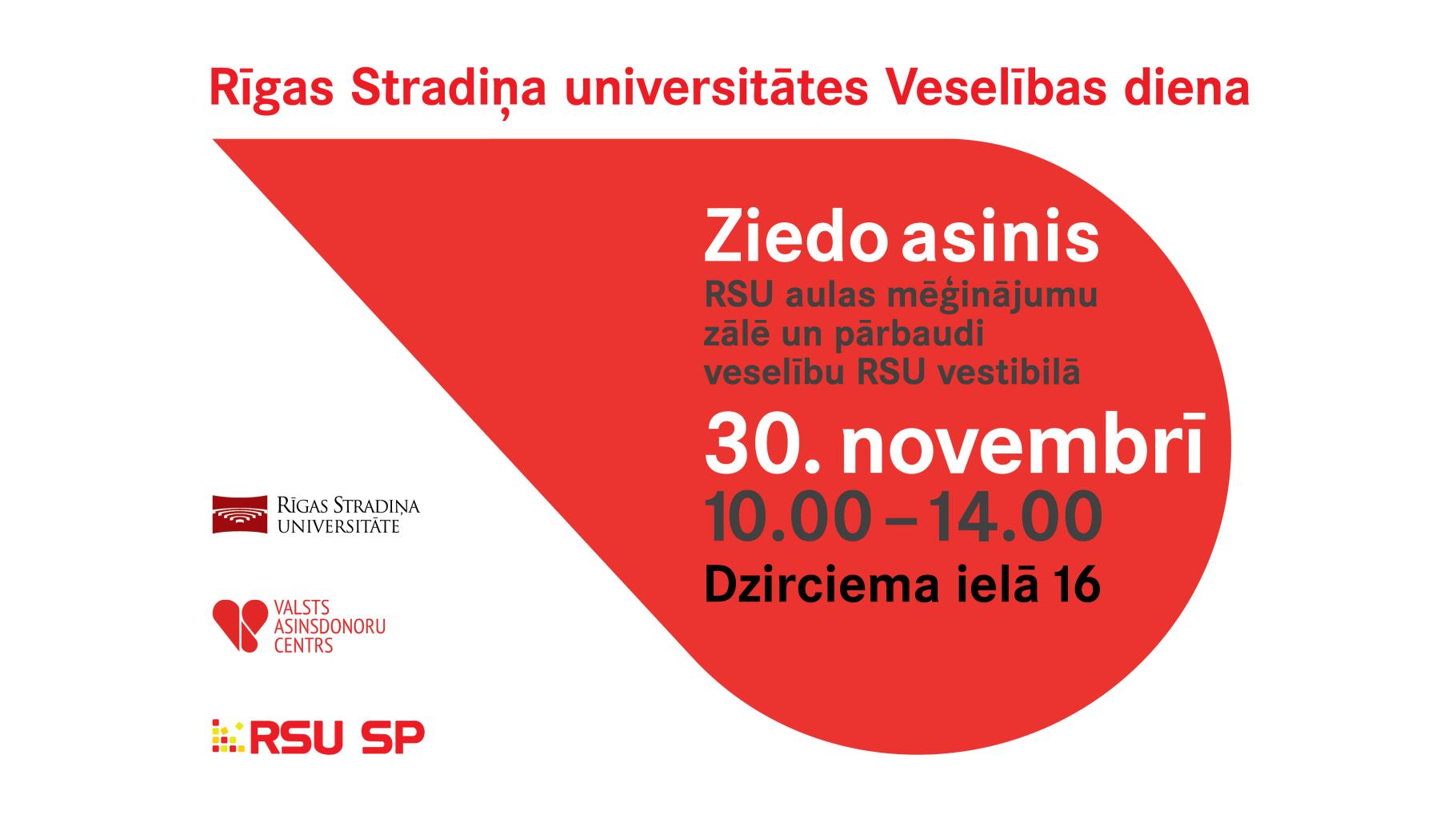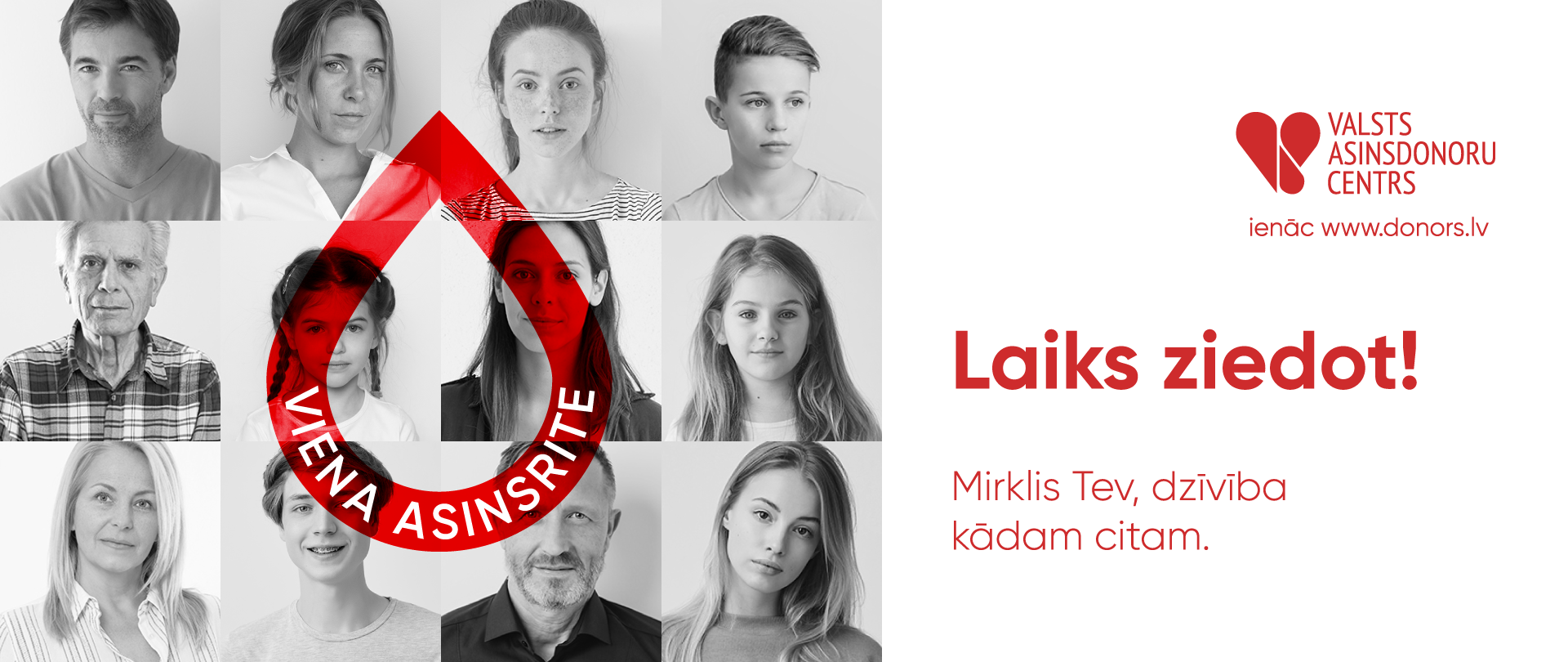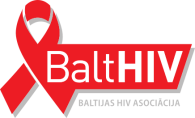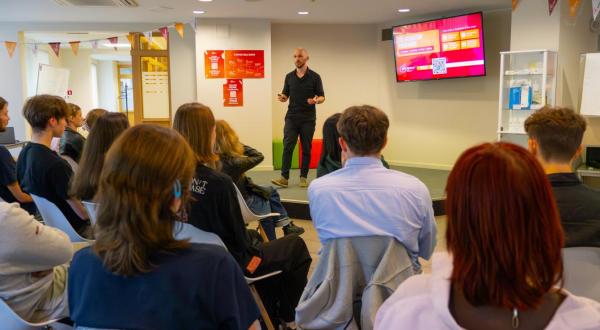.
Give blood and get a health check on RSU Health Day!
For Students
For RSU Employees
The Rīga Stradiņš University's (RSU) traditional Health Day will take place on Thursday, 30 November, from 10.00 to 14.00, at 16 Dzirciema iela. Staff and students will have the opportunity to donate blood and undergo simple health tests with students from a variety of interest groups.


You will be able to give blood in the rehearsal room off the Great Hall and undergo simple health tests in the lobby to determine your blood sugar levels, body mass index, check your eyesight, perform an HIV and other tests, learn about eating disorders, types of anaesthesia, how to properly dispose of medicines, and learn how to provide first aid.
The following interest groups will participate in RSU Health Day
- Medical simulation – first aid
- Haematology – blood group (serological) testing
- Infectology – testing for hepatitis C, syphilis and HIV
- Pharmacology – correct disposal of medicines
- Physiology – information on controlling blood pressure and preventing arterial hypertension
- Psychiatry – the EAT-26 scale for assessing risk of eating disorders
- Dermatovenerology – dermatoscopy and the role of sunscreen in daily life
- Endocrinology and metabolic diseases – blood glucose testing, diabetes education
- Ophthalmology – eye pressure and visual acuity, autorefractometry
- Legal medicine – information on where to turn in case of a violent incident
- Nutrition – bioimpedance analysis, body mass index, informative materials from the Latvian Centre for Disease Prevention and Control
- Anesthesiology and resuscitation – information on types of anaesthesia and pre-operative consultations
Donors must present a valid ID (passport or ID card, eID) and provide their bank account number.
Donors without an ID will not be accepted.
Donors without an ID will not be accepted.
FAQ
- Can I give blood?
You can give blood if you...
- are between 18–65 years old,
- weight no less than 50 kg,
- have not drunk alcohol the day before giving blood, you have eaten, slept, rested and feel good,
- are healthy and have not recently been sick,
- maintain a healthy diet and have had plenty of fluids beforehand,
- have not given blood at least 9 weeks prior.
- When can I not give blood?
You must not give blood for a certain period of time in the following cases:
- if you feel tired or unwell on the day;
- if you have returned from a country where you are at increased risk of contracting an infectious disease (map of endemic countries map);
- pregnant and breastfeeding women;
- after childbirth, or artificial termination of pregnancy;
- after surgery or dental manipulation;
- if damaged skin or mucous membranes have been exposed to foreign blood or if you have been injured by a needle;
- after a tick bite, Lyme disease, tick-borne encephalitis;
- after an endoscopy, needle therapy, tattooing, or piercing;
- after coming into contact with a person with viral hepatitis;
- after sexual contact with an HIV-infected person;
- while using medicines (except contraceptives);
- after certain vaccinations (please, call 80000003 for more information);
- during any acute illness;
- during an allergy flare-up (skin rashes, allergic rhinitis, etc.);
- if you have a history of tularaemia, brucellosis, malaria, tuberculosis, toxoplasmosis, Q fever, osteomyelitis, syphilis;
- in some cases, if the elbow vein is not appropriate for taking a blood sample;
- in the case of recurrent chlorosis (cloudy plasma).
- What are the benefits of giving blood?
- Moral satisfaction - one donation can help three people.
- The body's own hematopoietic system is stimulated, restoring the composition of the blood.
- People who give blood are less likely to suffer from acute and chronic diseases.
- You can find out your pulse, blood pressure and haemoglobin levels, hepatitis C antibodies, etc. Test results can be obtained within five working days by notifying the donor registrar before you give blood.
- Getting one paid day off (you must obtain a certificate and submit it to your employer).
- If you give blood three or more times in a year (in 365 days), you can get a donor privilege card, which gives you access to various discounts.
According to the World Health Organisation, people who give blood regularly live on average five years longer because their hematopoietic systems are activated and immunity improves.
For more about giving blood in Latvia: www.donors.lv or 8000 0003.


Related news
 Develop your business skills and bring ideas to life with the B-Space incubation programmeFor RSU Employees, For High School Students, For Students, Innovation
Develop your business skills and bring ideas to life with the B-Space incubation programmeFor RSU Employees, For High School Students, For Students, Innovation


